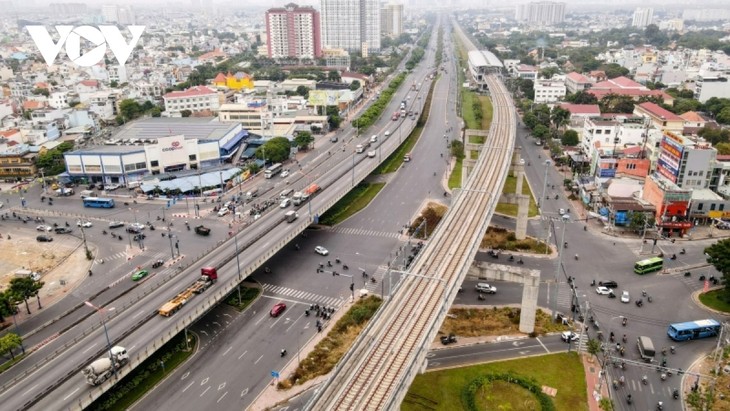(VOVWORLD) - Due to COVID-19 and the global economic recession, HCMC’s FDI attraction has slowed down. Since the beginning of this year, the municipal administration has changed its strategy to focus on projects of high feasibility that involve new technologies, high added value, and spillover effects, and connect production with global supply chains.
 Ho Chi Minh City is urged to develop public investment infrastructure to strengthen regional linkages for FDI attraction. (Photo: VOV) Ho Chi Minh City is urged to develop public investment infrastructure to strengthen regional linkages for FDI attraction. (Photo: VOV) |
According to the municipal Department of Planning and Investment, from 1988 to April of this year, HCMC remained the leader in attracting investment capital from 117 countries and territories, with 11,220 projects worth 83 billion USD.
But last year it attracted only 4.3 billion USD, nearly 40% less than the previous year. In the first four months of 2023, the city attracted less than 980 million USD in FDI, down 23%. The investment has gone mainly to repairs, trade, and ICT.
Dr. Nguyen Tu Anh, Director of the General Economics Department of the Party Central Committee's Economic Commission, attributes the decline to worry about the imposition of a global minimum tax that will negate the advantage of countries with tax incentives like Vietnam.
He said, "Vietnam offers a lot of incentives to FDI enterprises, especially large corporations, who are taxed less than 15%. If we keep that incentive, their country will charge them 15% more and the incentive will no longer work."
Since the beginning of this year, the Planning and Investment Department has developed a project to mobilize social investment and foreign investment under which the city will target potential FDI projects selectively, taking quality, efficiency, high-tech, and environmental protection as the main evaluation criteria. The most welcomed industries will be mechanical engineering, electronics, IT, plastic, rubber, food processing, and digital economy.
In addition, Ho Chi Minh City will continue to make it easier for overseas Vietnamese to contribute capital or join ventures with domestic businesses, promulgate tax incentives for OVs, and create a favorable investment environment to attract more remittances.
Dr. Nguyen Tri Hieu, a Vietnamese in the US and a banking-finance expert, called for continuing the policy of not taxing remittances from OVs to increase their confidence in investment opportunities.
He underscored the need to stabilize the macro-economy so that OVs have the confidence to send money to Vietnam for personal, consumer, or business purposes. “OVs know that we were facing difficulties in the first quarter of this year, so more measures for remittances and OVs are needed,” Hieu noted.
 Cao Thi Phi Van, ITPC Deputy Director (Photo: VOV) Cao Thi Phi Van, ITPC Deputy Director (Photo: VOV) |
To lure more high-quality FDI capital, Cao Thi Phi Van, Deputy Director of the Investment and Trade Promotion Center (ITPC), says HCMC needs to focus on administrative reform, making the investment environment transparent, changing the approach to investment attraction and providing information to investors, and developing transportation infrastructure to strengthen regional linkages.
"Ho Chi Minh City can develop only when the surrounding provinces also develop. Then Ho Chi Minh City can link with provinces and other cities to form a strong raw material area and supply chain," said Van.
Pham Phu Truong, Director General of the Global Integration Business Consulting Company, said that, in addition to expanding links, the Center can co-operate with other organizations to invite foreign partners to do business in Ho Chi Minh City.
“We can attract individual investors,” Truong said, adding, “Entrepreneurs and investment funds with many relationships are also easy-to-share communication channel with other investors. Therefore, the Centre may consider inviting those groups of financiers who understand the city’s operational mechanisms, thus facilitating foreign investment attraction.”
Van said her Center will continue to expand links with foreign diplomatic missions in line with what the city is prioritizing. It will guide investors to carry out licensing procedures, advise the municipal government to upgrade infrastructure, while supporting businesses in connecting through exhibitions on auxiliary industries and investment in manufacturing.
This could be done by building a trade and investment promotion center that will act as an agency to receive and summaries feedback from departments and sectors to deal with investors' recommendations and difficulties and provide more support for businesses, according to Van.
Truong suggested that there should be an assessment of potential investors aimed at attracting strategic financiers to pull in others, thereby opening up new development space for HCMC moving forward.